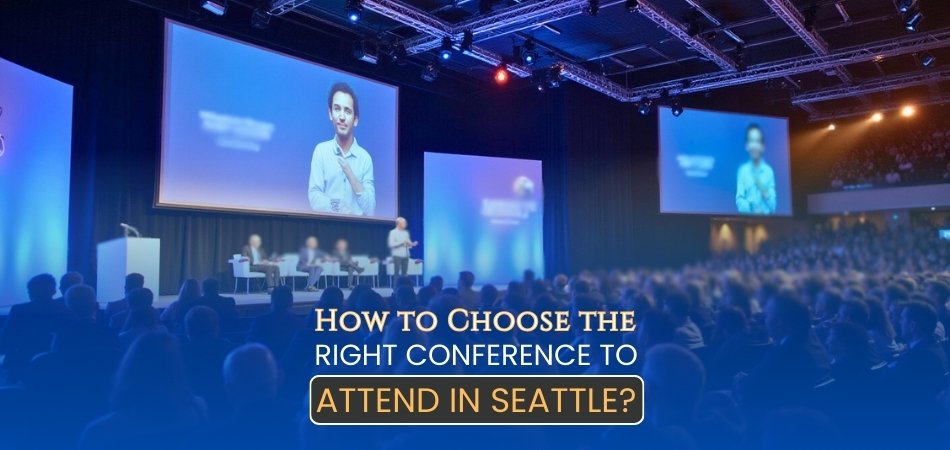Conferences provide excellent opportunities for networking, learning, and professional growth, especially in vibrant cities like Seattle. But with so many events to choose from, it can be challenging to determine which one will truly benefit your career. So, how to choose the right conference to attend in Seattle?
Start by identifying your objectives, such as networking, learning, or career growth. Research conferences based on relevant topics, speakers, and industries. Don’t forget to research past events, read reviews, and review the agenda to ensure that aligns with your professional goals and interests for the best experience and value.
Want to know more about selecting the right conference for your goals? Check out the full article for detailed tips and insights on how to make the best decision. Take advantage of this great opportunity to advance your career.
How to Choose the Right Conference to Attend in Seattle? Simple Steps to Follow
The city of Seattle hosts dynamic conferences across a wide range of industries, which provide opportunities for professional development. However, with so many options available, choosing the right conference can be challenging. Follow this step-by-step guide to ensure you select the perfect event for your goals and interests.

Step 1: Define Your Professional Goals
Before attending any conference, it is essential to identify what you hope to achieve. Whether you aim to expand your network, gain new insights, or develop specific skills, having clear objectives helps streamline your choices. This clarity allows you to filter out events that do not align with your aspirations. A focused approach ensures you invest time and resources wisely.
Step 2: Research Industry Relevance
Not every conference will benefit your career path. Look for upcoming conferences in Seattle that address current trends and challenges within your industry. A relevant conference will provide valuable insights and practical takeaways. This ensures your time and investment lead to real growth.
Step 3: Evaluate Networking Opportunities
Conferences offer a unique chance to meet like-minded professionals and potential collaborators. Check if the event includes networking sessions, workshops, or social gatherings. The more chances to connect with others, the better. Networking can lead to lasting relationships and future opportunities.
Step 4: Assess Speaker Quality and Expertise
Speakers play a vital role in shaping the value of a conference. Look into the experience and expertise of the presenters. High-quality speakers can provide fresh perspectives and actionable advice. This can turn a good conference into a great learning experience.
Step 5. Consider the Conference Size
Conference size can impact your overall experience. Larger events may offer broader exposure, while smaller conferences often provide more personalized interactions. Think about which environment suits your learning and networking style. A balanced choice can enhance the value you gain.
Step 6: Analyze the Agenda and Topics
Review the conference agenda to ensure it matches your interests and professional needs. Focus on sessions, workshops, and panel discussions relevant to your goals. A well-structured agenda indicates a thoughtfully organized event. It also helps you plan your time effectively.
Step 7: Read Reviews and Feedback from Past Attendees
Learning from others’ experiences can provide useful insights. Search for reviews and testimonials from past attendees to gauge the conference’s quality. Look for consistent praise or recurring issues mentioned in the feedback. This research can help you avoid disappointing experiences.
Large vs. Small Conferences: Which Is Right for You?
When deciding between large and small conferences, recognizing the unique benefits of each can help you make an informed choice. Large conferences offer expansive opportunities and exposure, while smaller events provide intimacy and focused interactions. Below is a detailed comparison to guide your decision-making process.
| Criteria | Large Conferences | Small Conferences |
| Networking Opportunities | Broader exposure to diverse professionals and industries. | More intimate and meaningful connections. |
| Learning Environment | Extensive sessions and workshops with a variety of topics. | Personalized and focused learning experiences. |
| Speaker Quality | Often features high-profile industry leaders and influencers. | Access to niche experts and interactive sessions. |
| Conference Size | Thousands of attendees, bustling and energetic atmosphere. | Smaller groups relaxed and less overwhelming. |
| Interaction Level | Limited personal interaction with speakers and peers. | Greater chances for direct engagement and discussions. |
| Cost and Accessibility | Generally more expensive, and may require advanced planning. | Often more affordable and easier to attend locally. |
| Content Variety | Wide range of topics but may feel generalized. | Specific content tailored to particular interests or industries. |
| Exhibitor Presence | Large expo halls with many vendors and exhibitors. | Fewer exhibitors, but often more relevant to the audience. |
| Flexibility in Attendance | More structured with a fixed schedule. | Flexible, with opportunities to engage in open discussions. |
| Overall Experience | High-energy, fast-paced, and great for trend-spotting. | Personalized, community-driven, and ideal for deep learning. |
How to Stay Updated on Seattle’s Conference Calendar?
There are a number of conferences held in Seattle throughout the year, offering great opportunities for learning and networking. Staying updated on upcoming events is key to selecting the right ones. With so many options, here’s how to stay informed about the city’s conference calendar.
Subscribe to Local Event Websites
Many websites specialize in listing conferences and events happening in Seattle. Subscribe to these platforms to receive notifications. These sites often offer calendars, schedules, and detailed descriptions. You’ll be the first to know about relevant conferences.
Follow Social Media Accounts
Many event organizers use social media to promote their conferences. Follow official conference pages and local Seattle event hashtags. You can easily track updates, speakers, and schedule changes. Social media is a great way to stay connected and informed.
Join Professional Associations
Industry-specific associations often share information about relevant conferences. Membership in these groups may grant exclusive access to events. Joining such associations helps in discovering conferences in Seattle that align with your professional goals. By networking within these groups, you will have the opportunity to gain valuable insight into the industry.
Network With Industry Peers
Your peers can be great resources for finding events. Often, colleagues and professionals share recommendations for useful conferences. Networking within your industry helps you learn about upcoming events early. Stay in touch with peers to stay informed about important dates.
Check University and College Calendars
Local universities and colleges often host academic conferences. They also share event calendars on their websites. Many of these events are open to the public, offering valuable learning experiences. University-hosted events are often specialized and feature high-quality speakers.
Set Google Alerts
Google Alerts can be a simple yet effective way to track Seattle conferences. Set alerts for terms like “Seattle conferences” or “events in Seattle.” You’ll receive updates directly in your inbox as soon as new events are announced. This method ensures you never miss an important conference.
Why You Should Look at Previous Conferences Before Attending?
Looking at previous conferences before attending a new event can provide valuable insights. Reviewing past events helps you understand the conference’s quality and relevance. You can assess if the conference aligns with your professional goals and if the sessions match your interests.
Researching past conferences allows you to learn about the speakers and topics covered. You can determine if the speakers are industry leaders or if the topics are current and valuable. It also helps identify the kind of networking opportunities available and if they match your expectations.
By exploring previous conferences, you can also gauge attendee feedback and experiences. Reviews and testimonials reveal what others found beneficial or lacking in the event. This research helps avoid investing time and money in conferences that may not provide significant value.
Best Ways to Manage Travel and Accommodation Costs for Seattle Events
There is nothing more exciting than attending events in Seattle, but travel and accommodation are expensive. Managing your budget efficiently is key to making the most of your experience. Here are some smart ways to keep your costs down while attending conferences or other events.
Book Flights Early for Better Deals
Booking flights in advance often helps secure the best prices. Many airlines offer discounts for early bookings and flexible dates. Use fare comparison websites to find the most affordable options. Avoid last-minute bookings, which can significantly increase costs.
Choose Budget-Friendly Accommodation
Seattle offers a range of accommodation options, from luxury hotels to budget-friendly alternatives. Consider staying in motels, hostels, or short-term rentals. Booking platforms often provide deals and discounts for longer stays. Staying slightly outside downtown can also save money.
Use Public Transportation
Several modes of public transportation are available in Seattle, including buses, light rail, and ferries. Using public transit can cut down on taxi or ride-share costs. Purchase day passes or multi-day tickets for additional savings. You can also reduce transportation expenses by walking or biking.
Share Accommodation with Colleagues
If attending an event with colleagues, consider sharing accommodation to reduce costs. Splitting the cost of a room or rental can significantly lower expenses. Shared housing also enhances networking and collaboration opportunities. This option is both economical and practical.
Look for Conference Discounts
Many conferences offer discounts on hotels or transportation for attendees. Check the event website for partnership deals and promotional codes. These offers can help reduce conference expenses in Seattle, making the trip more affordable. Signing up early can also lead to special offers.
Plan Meals Wisely
Eating out for every meal can become expensive quickly. Consider packing snacks or preparing simple meals when possible. Look for local markets or grocery stores to save on food costs. Research affordable dining options near your accommodation.
Frequently Asked Questions
Here are some frequently asked questions regarding how to choose the right conference to attend in Seattle. These FAQs cover a wide range of concerns that will help you make an informed decision for your next event.
Should I Prioritize Conferences With Hands-On Workshops?
Yes, conferences with hands-on workshops offer practical learning experiences that can enhance your skills. These sessions provide interactive opportunities to apply knowledge and learn directly from experts, making them highly valuable for both beginners and seasoned professionals.
How Important Is Conference Location Within Seattle?
Conference location matters if you want to minimize travel time and accommodation costs. Consider proximity to public transportation, dining, and lodging. Staying close to the conference venue can enhance convenience and reduce logistical challenges during your visit.
What Role Do Conference Themes Play in My Selection?
Conference themes provide insights into the event’s focus and content. A relevant theme ensures that sessions, speakers, and discussions align with your interests. Choosing a conference with a theme that matches your professional goals enhances the overall value of the experience.
Is It Worth Attending Conferences Outside My Industry?
Attending conferences outside your industry can be beneficial if you want to gain diverse perspectives, learn new skills, or explore emerging trends. These experiences can spark innovation and introduce new strategies that you can adapt to your specific field.
How Do I Determine if a Conference Is Worth the Investment?
Evaluate the conference agenda, speaker lineup, networking opportunities, and learning outcomes. Consider how the conference aligns with your career goals and whether the knowledge and connections gained justify the cost of attendance, including travel and accommodation.
How Can I Justify Conference Attendance to My Employer?
Present a clear case highlighting how the conference aligns with company goals, enhances your skills, and brings back valuable insights. Propose sharing takeaways with your team, demonstrating how your attendance can benefit the organization as a whole.
What Should I Bring to a Conference in Seattle?
Bring business cards, a notebook, a pen, and any necessary technology like a laptop or tablet. Comfortable clothing, a water bottle, and a phone charger are also essentials. Prepare to take notes and exchange contact information with new connections.
Bottom Line
When choosing a conference to attend in Seattle, you need to consider your professional goals and plan carefully. To make an informed decision, we have discussed how to assess industry relevance, evaluate networking opportunities, consider speaker quality, and analyze conference size.
If you are wondering how to choose the right conference to attend in Seattle, research past events, read reviews and study the agenda to ensure it aligns with your interests. Whether you prefer large conferences with broad exposure or smaller events with personalized interactions, selecting the right conference can significantly enhance your career growth. By staying updated on Seattle’s conference calendar and managing travel costs wisely, you can maximize the benefits of attending these valuable events.







